- The following is content from the press release -
About 60% of preschool and school respondents said that black bears appear on Setsubun, and about 80% said that they eat "Édantico" (a traditional Japanese meal) at home.
(headquartered in Chiyoda-ku, Tokyo; Nobuaki Chiba, President & CEO; hereinafter "Sen"), a provider of childcare tech services that enrich the child-rearing environment for preschools, schools, and parents with the power of technology under the motto "Peace for Children," conducted a "Survey on Parents' Awareness of Setsubun" among 135 parents of preschoolers and children attending preschool and school. (headquartered in Chiyoda-ku, Tokyo; Nobuaki Chiba, President & CEO; hereinafter referred to as "Sen") conducted a "Survey of Parents' Awareness of Setsubun" among 135 parents of preschoolers and children attending preschool and school.
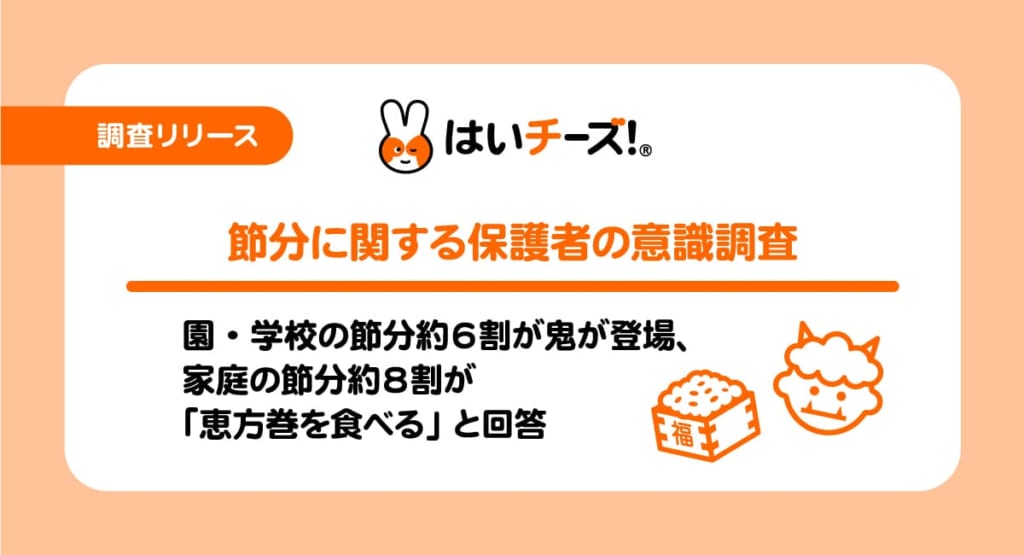
When asked how Setsubun events are held at their preschools and schools, the most common response was "Oni (demons) make an appearance (61.19%)," followed by "Bean-throwing (55.97%)" and "Special school lunch for Setsubun (41.79%)". When asked what kind of opportunity they expect Setsubun events to be for their children, the most common response was "for children to enjoy the event (84.44%)" at over 80%, while only 2.22% answered "nothing in particular".
When asked what they do at home for Setsubun, the most common response was "eat ehomaki (78.52%)," followed by "mamemaki (72.59%)" and "eat beans (65.93%)," with only 2.961 respondents saying "do nothing. When asked about the differences in Setsubun events between their childhood and the present, the most common responses were, "Ehoumaki was not a custom in the past," and "Ehoumaki was not a custom in the present. In the past, "ehomaki" was a culture unique to the Kansai region and not well known elsewhere, and was bought at local sushi restaurants. Now, however, it has spread nationwide and is available in the Kanto region as well. There are many different types of ehoumaki, such as seafood rolls, to choose from, and it is easy to buy them anywhere, including convenience stores. The most common answer was that they had not eaten ehoumaki before.
summary
Only 2.22% parents answered that they "have no particular expectations" for Setsubun events at preschool and school, while more than 80% expect that their children will enjoy the events. Only 2.961 parents answered "nothing" about Setsubun events at home, indicating that both preschool and home parents tend to view Setsubun events positively and actively enjoy them as "an opportunity for children to have fun.
As for the differences between Setsubun in the past and today, the most common response was "there was no custom of eating ehomaki in the past," while 78.521 TP6T respondents answered "eating ehomaki" as what they do for Setsubun at home now, indicating that the culture of eating ehomaki has spread over the past few decades.
Topics of Survey Results
1. Approximately 60% of the preschools have a black bear, and 80% expect "the children can enjoy the event.
2. 80% of respondents eat "み⽅⾷" on Setsubun at home.
3. Difference between Setsubun in the past and today "In the past, there was no custom of eating a "ebisuto" (a traditional Japanese meal).
Survey Results Topics Details
1. Approximately 60% of the preschools feature the appearance of a black bear, and 80% expect that "children will enjoy the event.
When asked if Setsubun events are held at their preschools or schools, the most common response was "The black bear appears (61.19%)," followed by "They make a fire festival (55.97%)" and "A special Setsubun meal is served (41.79%).
When asked what kind of opportunities they expected Setsubun events to provide for their children, the most popular answer was "for the children to enjoy the events (84.44%)" at over 80%, followed by "for the children to have an experience unique to Setsubun (76.30%)" and "for the children to understand the original meaning and customs of Setsubun (55.56%). Understanding the original meaning and customs of Setsubun (55.56%).
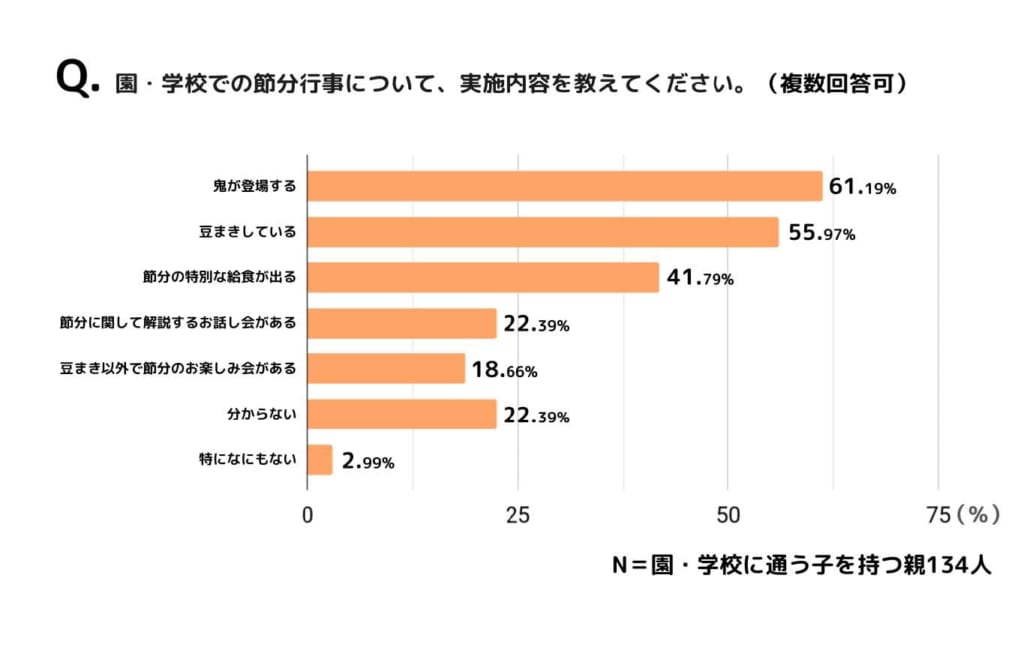
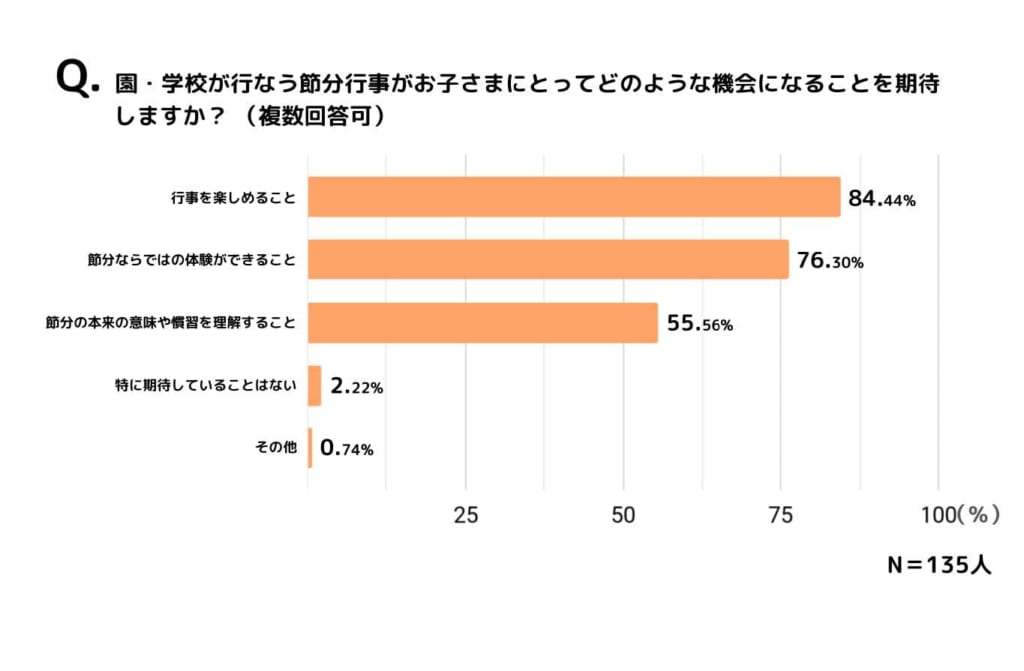
2. 80% of respondents eat "み⽅⾷" on Setsubun at home.
When asked what they do for Setsubun at home, the most common response was "eating dodging sushi rolls" (78.521 TP6T), followed by "sowing rice balls" (72.591 TP6T) and "eating rice balls" (65.931 TP6T). The majority of the respondents did not do anything in particular for Setsubun, but most of them tended to do some kind of Setsubun-related activity at home.
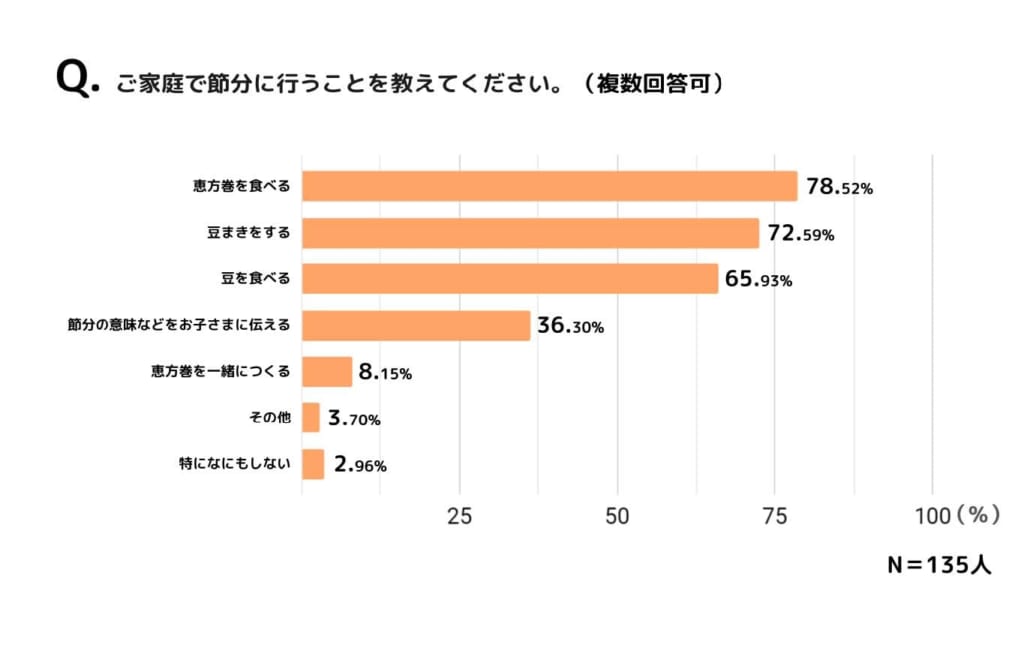
3. Difference between Setsubun in the past and today "In the past, there was no custom of eating a "ebisuto" (a traditional Japanese meal).
When asked about the differences between their own nieces' childhood and today's Setsubun festivities, they replied, "There was no custom of eating dodenmaki in the past. In the old days, the Dipstick was an authentically Kansai culture, not so well known elsewhere, and one had the impression of buying it at the local sushi shop. But now that it has spread nationwide, you can buy it in Kanto and other parts of Japan, and there are many different types of ehdanmaki to choose from, including seafood rolls, and it's easy to buy them anywhere, including convenience stores. I guess it depends on the region, but when I was a child, I didn't even know what a dodecimo was. The most common answer was that they did not used to eat it before. On the other hand, about 80% of the respondents to the previous question answered that they eat "entire meals", which shows that the culture of "ehdanmaki" has spread over the past few hundred years.
The next most common answer was about the beans used for sowing. "I heard that beans are dangerous for small children because they get stuck in their throats, so we roll up newspaper and sow beans instead. In our time, we used to sow the seeds properly, but now we sow peanuts with shells instead of seeds because of the news of deaths caused by feeding seeds to children with whole peanuts. When I was a child, my grandmother would scatter roasted peanuts and we would eat them as many times a year as we could. The results also show that people tend to throw alternative or individually wrapped foods instead of large size soybeans to prevent aspiration.
Survey Summary
Survey theme: Parents' awareness of Setsubun
Method of survey: Web-based questionnaire survey
Surveyed: 135 parents with children attending preschool, kindergarten, or school.
December 21, 2021 - January 12, 2022
Research entity: Sen Co.
Yes, Cheese! means]
Cheese and cheese! (https://sencorp.co.jp/service/With the motto of "Peace for Children", "Pangaea" is a comprehensive childcare tech service that aims to nurture the happiness of children in cooperation with daycare centers, kindergartens and other facilities that take care of children, as well as their parents.
Internet Photo Sales "Yes Cheese! Photo", ICT for childcare "Yes Cheese! System", meal preparation and nutrition education service "Yes Cheese! ×Veggie Link", album production "Yes Cheese! Photo", "Yes Cheese! x Veggie Link", album production "Yes Cheese! Currently, it is one of the largest childcare services in Japan with data on more than 10,000 preschools, more than 2.7 million users, and more than 100 million images of children.
Company Profile
Thousand Corporation
President and Representative Director: Nobuaki Chiba
Head Office: Keidanren Kaikan 13F, 1-3-2 Otemachi, Chiyoda-ku, Tokyo
Established: October 2004
TEL: 03-6266-6662
HP:https://sencorp.co.jp
Business: SaaS-type comprehensive childcare tech service "Yes Cheese! Business
Internet photo sales service "Hai Cheese & Cheese Photo" (Japanese only) Photo" (Internet photo sales service)https://info.8122.jp)
-Photographer Shooting Plan
-Teacher Photography Plan
-Photo Studio Photography Plan
ICT service for childcare operations "Yes Cheese! System" (https://hoiku-ict.com)
Food preparation service "Hai Cheese! ×Veggie Link" (https://vege-link.com/shokuiku/)
Album production service "Yes Cheese! Album" (https://album.8122.jp)
Video service "Yes Cheese! Movie".
- Video distribution platform
- Event Video Shooting
- PR video production and editing
Yes Cheese! is a registered trademark of Sen Corporation.

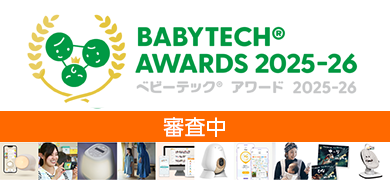
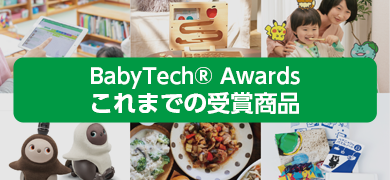
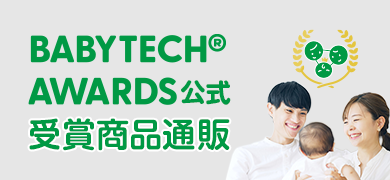
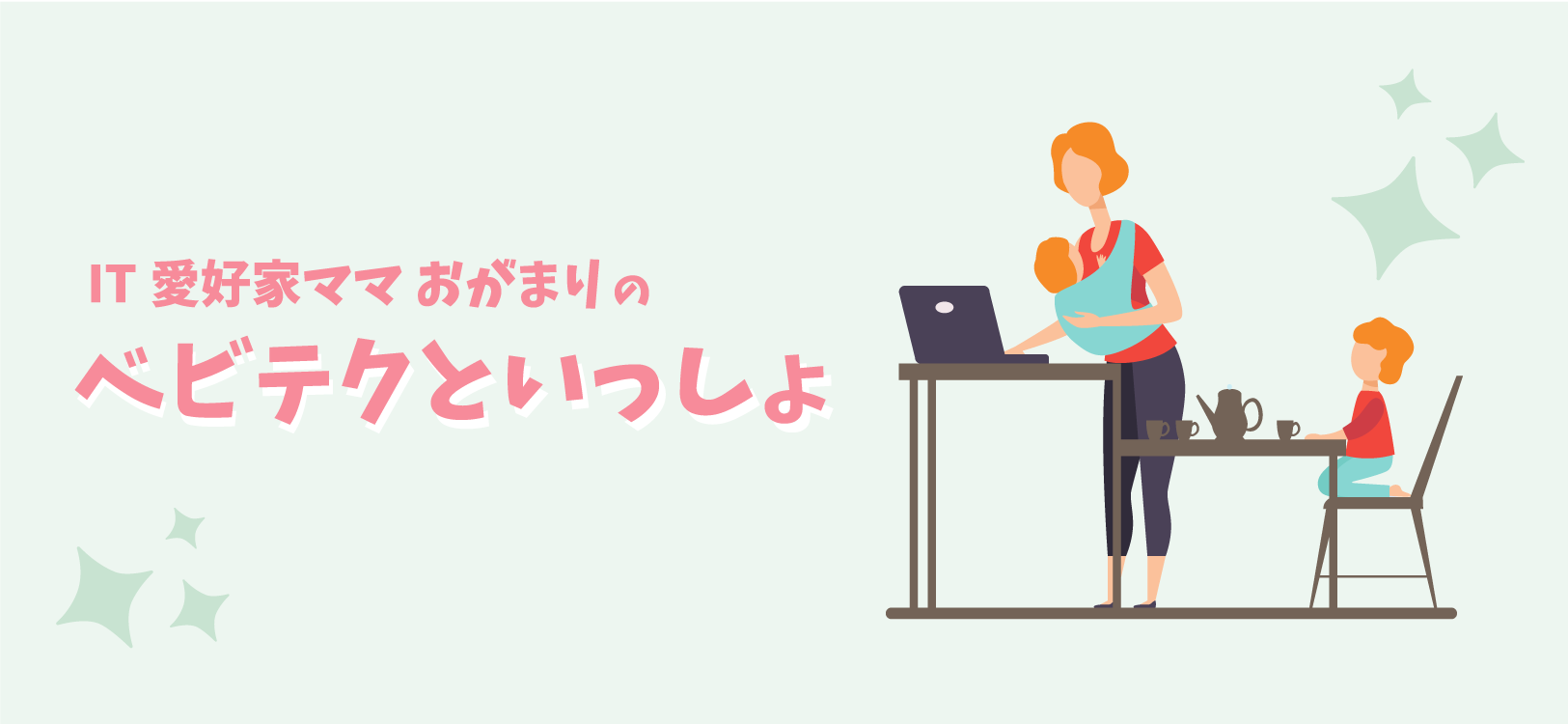
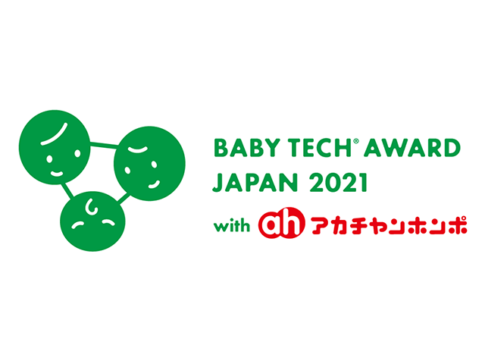


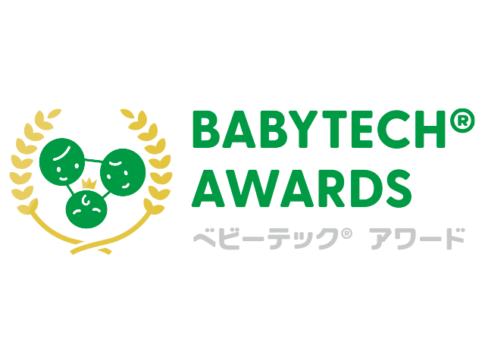


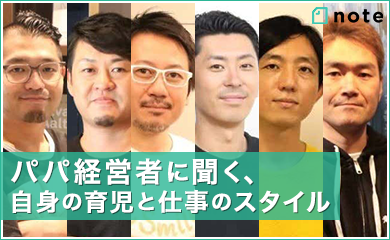
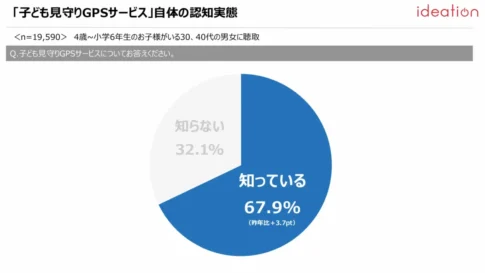

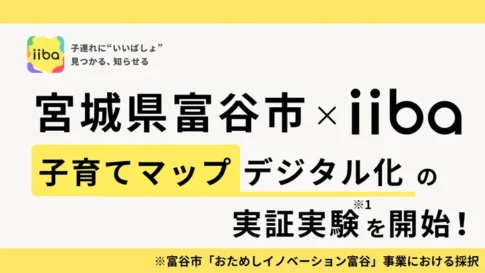
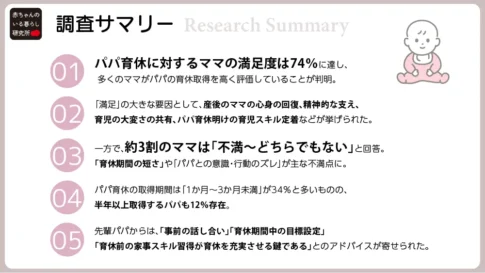
BTAJ2021 Childcare ICT Category Grand Prize Winner "Yes Cheese! This is a research release by Sen Corporation, a provider of SaaS-type comprehensive childcare tech services, including
February 3 is Setsubun. The most popular Setsubun events include bean-throwing and eating ehoumaki (rolls wrapped in ehoumaki, a traditional Japanese sweet made with soybeans and eho maki). I have seen online comments from children who say, "I don't want to go to preschool because the ogres are coming! I have seen some children's voices on the Internet saying, "I don't want to go to preschool because the ogres are coming! We conducted a survey on the awareness of such Setsubun events among preschoolers and parents with children attending preschool or school.
Let's take a look at the details of the survey from the press release.